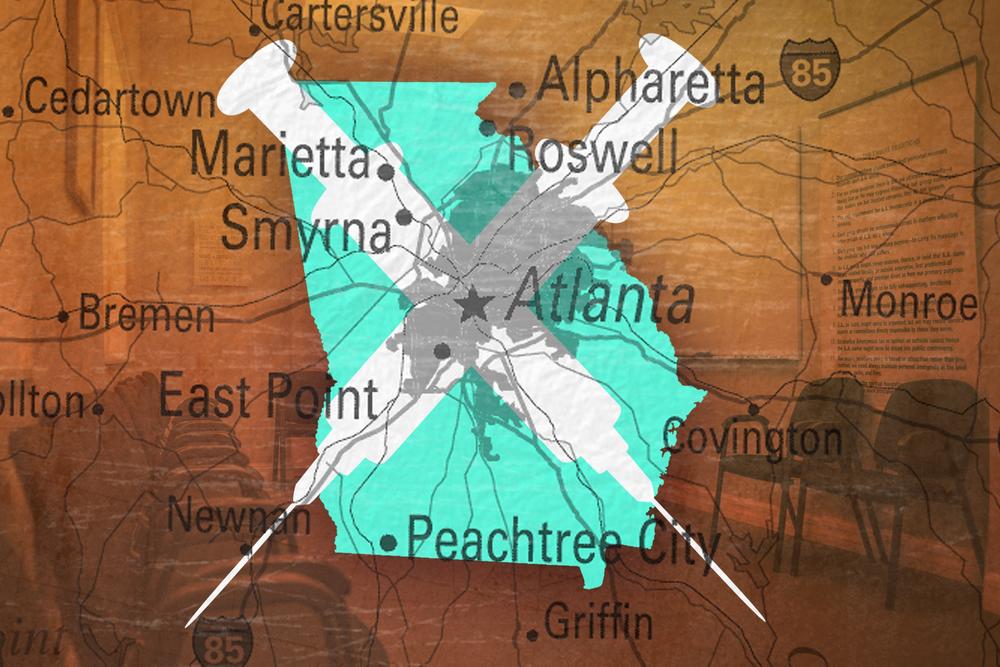Section Branding
Header Content
Addiction, Recovery: The Voices Of Georgia’s Opioid Crisis
Primary Content
On a recent sweltering afternoon, Jeremy stood on a street corner in Atlanta, remembering how his relationship with opioids started.
“I was stealing pain pills from my dad’s prescription jar: Percocet, Lortab, Oxycodone,” he said. “I had to have them before I went to work. I couldn’t work without them.”
Jeremy is 26 and a self-described drug addict. Because of the illegal nature of his habit, he’s asked us not to use his last name.
Jeremy grew up in what he describes as an ordinary, straight-laced home in suburban Atlanta. These days, he lives in the Bluff, a neighborhood known for it’s open air drug sales.
“One day a guy that I met said, ‘Hey man, you should try this heroin. It’s just like Oxycodone.’ Once I started doing that, I didn’t care about any other drug,” Jeremy said. “I didn’t realize it would take me this far, and I would end up in the situation I’m in.”
Jeremy knows the street corner well: it’s where he comes to get clean needles and and a free bite to eat, all thanks to the Atlanta Harm Reduction Coalition, a local non-profit.
Twice a week, a small group of volunteers operate Georgia’s only syringe exchange in the hulking shadow of an abandoned stone church in the English Avenue neighborhood--a place known as the Bluff.
“It’s Atlanta’s heroin, crack-cocaine--well, any substance you want, basically--buying, selling, and using spot,” said Mona Bennett, who’s run the program
Intravenous drug users, like Jeremy, come here to trade their used needles for clean ones and pick up doses of naloxone, a drug that treats opioid overdoses, all free of charge.
Dixie is another regular. She’s 22-years-old and lives with her boyfriend, who’s also a heroin user, in a van they park different places around Atlanta.
She dumps a pile of needles on top of a large red plastic bin as a volunteer counts them out, one by one using kitchen tongs. 73 used needles surrendered. 83 clean needles returned.
Dixie says she’s only been struggling with heroin addiction for about 6 months, but even in that time she’s had experiences with fentanyl, a synthetic opioid that’s often mixed with heroin.
The CDC says fentanyl is 50 times more potent than heroin and 100 times more potent than morphine. It links to the drug to recent spikes in opioid overdose deaths across the country, specifically, a 72 percent jump from 2014 to 2015.
Dixie says she and her boyfriend have both overdosed on heroin cut with fentanyl.
“There’s fentanyl in almost every little bit that’s out here. It’s gotten to the point where people actually want to buy the fentanyl itself. People are starting to just be attracted to that because of how strong it is,” she said.
John, who’s 54, tries to stay away from the stuff. He said he’s been using heroin off-and-on for 37 years, without any overdoses. That changed last year.
“I went out twice, dead. Twice. Got brought back. Fentanyl, both times. Fentanyl is one of the most horrible drugs there is going,” he said.
John says he lives in abandoned house in the neighborhood and panhandles to get by. Behind dark sunglasses his eyes are bright and clear. After all these years, he’s tired.
“And after a while, it just got really exhausting, and I was really tired of being tired all the time,” said Lauren Krause.
The 31-year-old says she started with pain pills, then started taking heroin after having a miscarriage.
Now, she’s in recovery and runs a weekly Heroin Anonymous meeting at a church in the well-manicured Atlanta suburb of Sandy Springs that she says regularly draws more than 100 people.
Krause says she’s got a job, a fiancee, and that she’s finally feeling OK. But getting clean wasn’t easy.
“For 15 years, all I knew was getting up and getting high. And so learning how to get up and brush my teeth and be an active member of society and take a shower every day–I had to learn. I had to literally have someone teach me how to do all those things,” she said.
Joe Difabbio says the learning curve has been steep, even as he’s started to get parts of his life together.
“I’m making some money. I’m starting to be self-supportive. And all those wonderful things that life has to offer, it’s not enough. It’s honestly not enough. There’s still going to be this hole inside my heart,” he said.
He says communing with other people struggling to stay sober helps fill that hole. That’s why he’s a regular at this HA meeting.
So is Ariel, who’s 25-years-old. She’d been trying to give up heroin for years, but was only able to stay sober for a few months at a time. Now, she’s been sober for about a year.
“What’s been really hard is having the willingness to do it all on my own. I wanted to stay clean and sober, and I wanted to do this for myself. And it’s a lot of forgiveness. I was raised thinking that if you do bad things, you’re a bad person. Nobody ever told me you’re just a sick person trying to get well.”
Georgia’s opioid crisis cuts across race, class, and age lines. That’s true across the country: the CDC says 91 Americans die from an opioid overdose every day.
Solving a nationwide public health emergency is no easy task. But all across Georgia, people are working to curb the epidemic.


